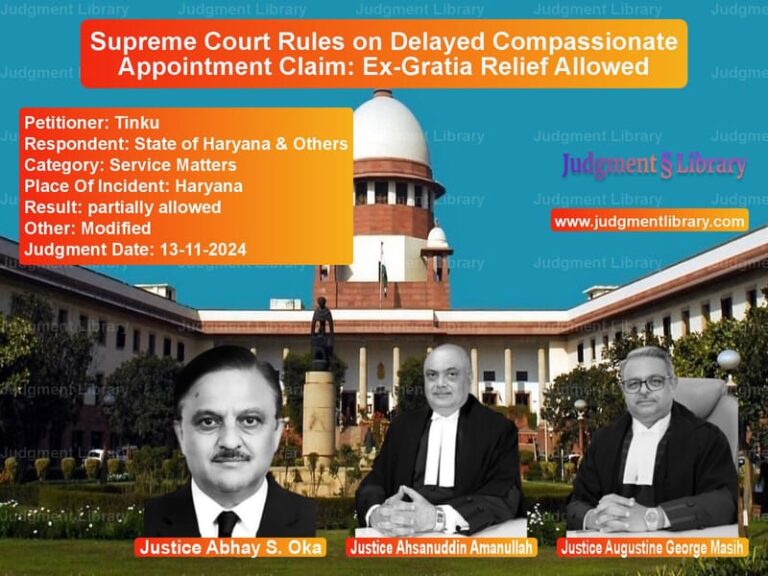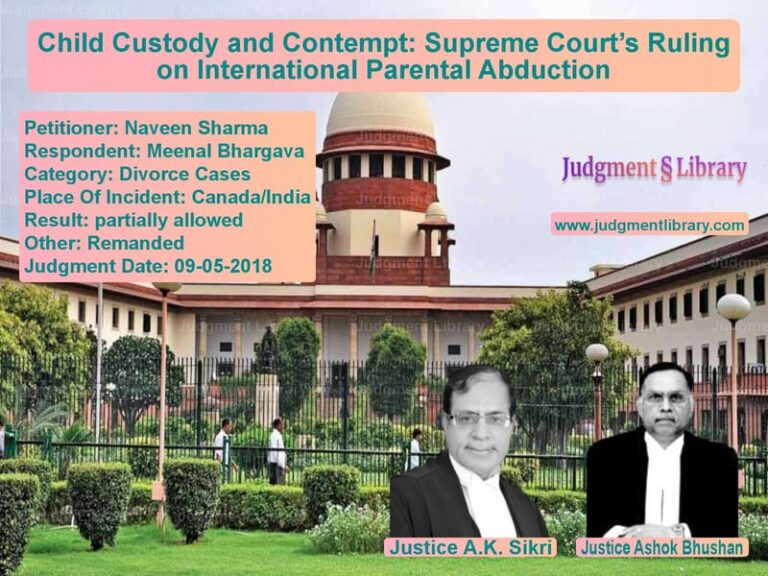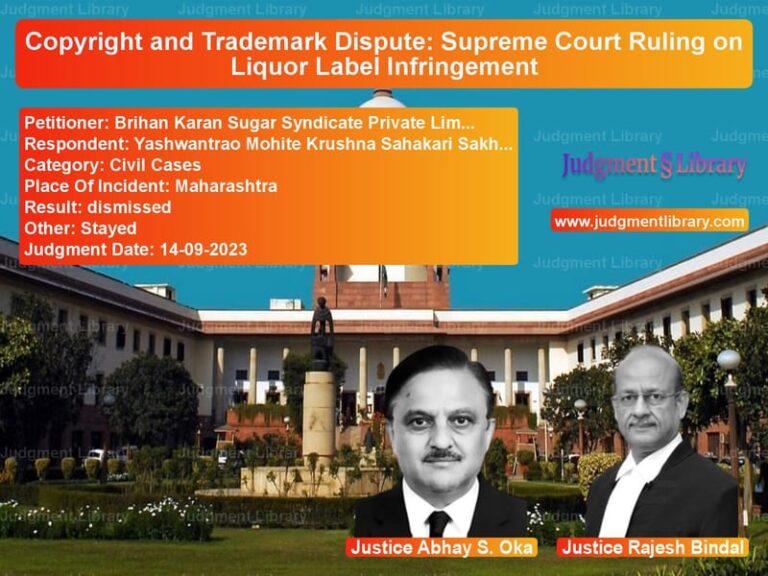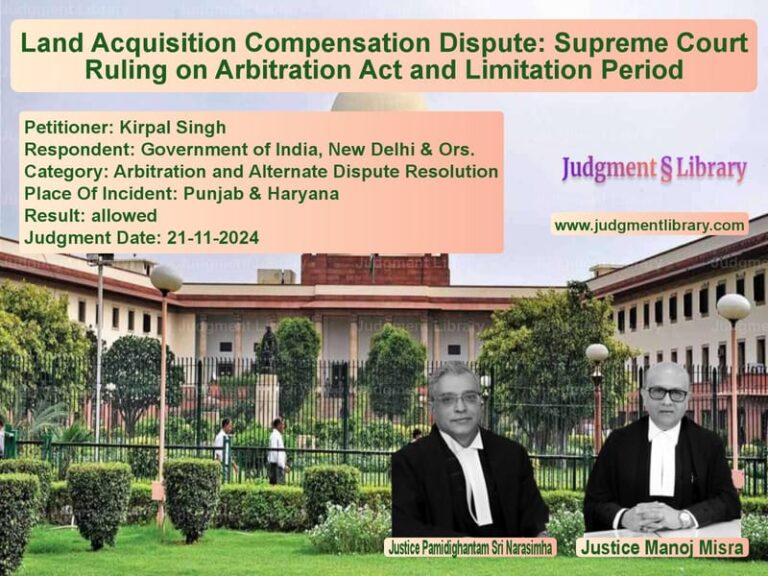Supreme Court Quashes Land Compensation Order: A Landmark Ruling on Limitation Laws
The Supreme Court of India recently delivered a crucial ruling in the case of State of Himachal Pradesh & Ors. vs. Chandervir Singh Negi. The case revolved around a dispute concerning land acquisition and compensation, with the primary legal question being whether the suit filed by the plaintiff was barred by the statute of limitations.
Background of the Case
The respondent, Chandervir Singh Negi, filed a suit seeking compensation for land that was allegedly taken by the State of Himachal Pradesh for road construction without following due acquisition procedures. The plaintiff contended that the authorities had built a road in 1987 on his land without acquiring it through proper legal channels, leading to damages to fruit-bearing trees on his property.
The state, on the other hand, argued that the construction was carried out with the plaintiff’s consent, and he had never raised any grievance for over 15 years. The state further contended that the claim was barred by limitation since the suit was filed only in 2003.
Petitioners’ Arguments
- The state contended that the road construction was completed in 1987 with the consent of the landowner.
- The plaintiff did not raise any complaint or claim compensation for over 15 years, making the suit barred under Articles 58 and 72 of the Limitation Act.
- The courts should not interfere in findings that have already been upheld by both the trial court and the first appellate court.
- The government argued that raising a claim after such a long delay is unfair and should not be entertained.
Respondents’ Arguments
- The respondent contended that his land was taken without due process, and he was entitled to fair compensation.
- He claimed that his fruit-bearing trees were damaged during the construction, and he was never compensated for the loss.
- The respondent argued that his suit was valid because the authorities had never formally acquired his land under the Land Acquisition Act.
Key Observations by the Supreme Court
The Supreme Court analyzed the evidence and legal provisions extensively, making several key observations:
- The Court noted that the road construction took place in 1987, and the respondent did not raise any legal claim until 2003.
- The statute of limitations applies to land acquisition claims, and a delay of over 15 years is excessive and legally untenable.
- The High Court, in allowing the second appeal, had overlooked the fundamental issue of limitation, which was properly considered by the trial court and the first appellate court.
- The Court reaffirmed that legal claims must be raised within a reasonable period, and undue delay weakens the legitimacy of such claims.
Judgment
The Supreme Court ruled in favor of the State of Himachal Pradesh, quashing the High Court’s decision and restoring the trial court’s ruling. The key takeaways from the judgment were:
- The suit was indeed time-barred under Articles 58 and 72 of the Limitation Act.
- The respondent had ample time to raise his concerns, yet he waited for over 15 years before filing a suit.
- Legal certainty requires adherence to limitation laws, and claims filed beyond the statutory period cannot be entertained.
Implications of the Judgment
This ruling has significant implications for land acquisition and compensation disputes:
- It reinforces the importance of adhering to limitation laws in property disputes.
- The judgment provides clarity on the legal consequences of delayed claims in land acquisition cases.
- It upholds the principle that courts should not override statutory limitations unless extraordinary circumstances exist.
- The ruling serves as a precedent for similar cases where landowners attempt to claim compensation decades after an alleged government action.
Conclusion
The Supreme Court’s ruling in this case is a landmark decision that upholds the sanctity of limitation laws. By reversing the High Court’s decision, the Court has reinforced the principle that legal claims must be raised in a timely manner. This judgment serves as a crucial precedent for future land acquisition and compensation disputes, ensuring that statutory limitations are respected and legal certainty is maintained.
Petitioner Name: State of Himachal Pradesh & Ors..Respondent Name: Chandervir Singh Negi.Judgment By: Justice M. R. Shah, Justice C.T. Ravikumar.Place Of Incident: Himachal Pradesh, India.Judgment Date: 24-02-2023.
Don’t miss out on the full details! Download the complete judgment in PDF format below and gain valuable insights instantly!
Download Judgment: state-of-himachal-pr-vs-chandervir-singh-neg-supreme-court-of-india-judgment-dated-24-02-2023.pdf
Directly Download Judgment: Directly download this Judgment
See all petitions in Property Disputes
See all petitions in Landlord-Tenant Disputes
See all petitions in Damages and Compensation
See all petitions in Contract Disputes
See all petitions in Specific Performance
See all petitions in Judgment by Mukeshkumar Rasikbhai Shah
See all petitions in Judgment by C.T. Ravikumar
See all petitions in allowed
See all petitions in supreme court of India judgments February 2023
See all petitions in 2023 judgments
See all posts in Civil Cases Category
See all allowed petitions in Civil Cases Category
See all Dismissed petitions in Civil Cases Category
See all partially allowed petitions in Civil Cases Category







